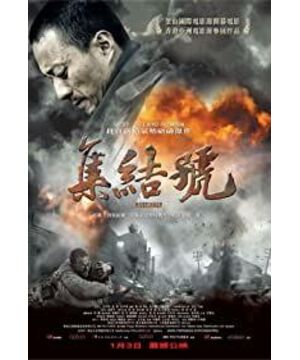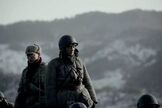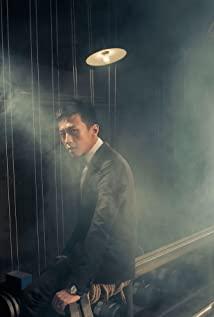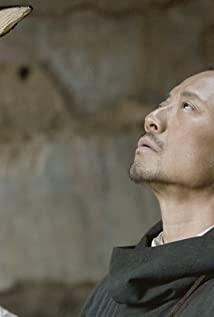In fact, Guzidi has been bombed to death. Guzidi had no father, no mother, no name or surname. Now he is also one of those countless unknown dead, past and present. The recent controversy over the number of people killed in the Nanjing Massacre has been raging. Seventy years have passed since the massacre in 1937. Today we cannot figure out the number of our compatriots who died. It is still very vague. 300000. The skepticism of the Japanese is indeed abominable, but for us, the five zeros after the 3 are indeed very empty, because it is impossible for us to understand the appearance, age, and temperament of everyone who has died. This is indeed helpless in terms of history and war, and for us as retrospectors today, this helplessness reveals sadness behind it. The film’s slogan: "Every sacrifice is immortal." So what is immortality, Baidu Encyclopedia explains: It means that glorious deeds and great spirit will be passed on forever and will not be obliterated. It is the spirit and deeds that are immortal, not the sacrificed individuals. The main idea of the movie is to show that every "victim" is immortal. This is a romantic saying that one's way of immortality is nothing more than to stay in the annals of history and go down in history forever. The main line of the movie is the process in which a heroic company commander who has done meritorious service suffers constant grievances and misunderstandings, and tries his best to "correct the name" of the dead soldiers. But we can imagine that it is only a minority that have been proven. Most of the martyrs still have no names. There are endless cemeteries and tombstones. The wooden stakes of the same height are printed with "Unknown Martyrs" in the same font. They cannot distinguish each other, but They are not cloned. In the cemetery, Gu Zidi (the company commander of 47 soldiers of the Jiu Company), whose eyes had been half-blind, lay on the tombstone trying to find the name of his soldier. The war was won. There were so many dead soldiers. They were like "a drop of water in the river, who knows which spring he came from". This is cruel to say-who knows or who cares-but if it is said from an era where collective values are highly admired and personal values are basically ignored, it would not seem strange. But now is different. Now a people-oriented society, individual values have been fully demonstrated, and the ubiquitous media is creating "immortality" every day. After the Meng brothers escaped underground, the media took photos of them two like two heroes. The Meng Brothers, who are currently being selected by "Southern Weekend" in 2007, are the candidates, and they are now ranked eighth. We did not help when people drank pee and dig stones in the mine to escape. Why did they escape after they escaped? Report as an anecdote? What if they died? To die is to die, with all the miners who were buried in the black kiln and black well. The Meng brothers are a very embarrassing role for us who are noisy. So this year, Feng Xiaogang chose a very good topic at the right time and from the right perspective. Just considering the social significance of the film, "Assembly Number" was very successful. Forty minutes before the most authentic image of a Chinese soldier, one siege, one In the resistance war, my biggest feeling is that China finally has a decent war scene. We also have the bullet sound effects in "Saving the Soldier", and we also have the cool gray high-quality pictures of "Tai Chi Flag" (although these are all It's the special effects that Director Feng asked Koreans to do), and the most important thing is that the actors on the screen speak human words regardless of bird language. The image of real Chinese soldiers finally appeared on the screen, and they were no worse than those dumb American soldiers. The image of Jiulian soldiers portrayed by Feng Xiaogang in the first forty minutes is real, kind, and cute. All of them are real men and all are real heroes. They are a line of long Jiao Dapeng, instructor Wang Jincun, sniper Jiang Maocai, and blaster Lu Kuangou. They are all ordinary and real Chinese fighters. They are good brothers. All the actors are outstanding. Thunder in 40 minutes and rain in 80 minutes. I think Liu Heng is still very painful squatting in Huayi's racecourse. Anyone who has been exposed to a little screenwriting theory knows that the act of rectification and search must be an article of resistance, a conflict and a gap, and this is repeated wave after wave until the protagonist takes the greatest risk to complete his action. . So apart from the fact that it is really hard to find, what on earth is preventing Guzidi from looking for the collapsed cellar, this can't be stated clearly, can't be stated clearly, and if you say it, you won't be able to meet with the audience. Therefore, Liu Heng can only write emotional articles, so we can only see the wronged Guzidi and the weeping Guzidi. He was originally a fighting hero but was regarded as a captive of the Kuomintang. The reason why we can accept the grievance of the next eighty minutes is because the company commander has been very successful and very cute in the first forty minutes of the movie, so the next eighty minutes evokes our sympathy. We are in the cinema. Tears shed are tears of sympathy. Feng Xiaogang has always emphasized that this is a sincere and moving movie in the promotion of the movie. He also repeated that he and the actors cried many times when watching the script, but it was a pity that I was so suffocated by the urine that I just cried. Once, after I got out of the cinema, I always blamed myself. "Assembly Number" is a tragedy. I saw the honor that the last millet was fighting back for Quan Lien-those liberation medals were neatly stacked in small paper bags, like an egg that could not hatch a life. . Honor cannot stay on the chest, it is empty comfort. This is what Guzidi, the half-blind old company commander, desperately won back. There was thunder in the first forty minutes, and rain was wet for the next 80 minutes. This is the structure of "Assembly Number". Some people complained that the front and rear parts are one size fits all and the difference is too big. It rains after the thunder, or it rains while thundering. I think the effect that the audience most hopes to see is a combination of thunder and rain. But speaking of it, this is not There is a way. If you use flashbacks and interspersed methods, the memories of the veteran Gu Zidi, then the coherent war scenes will be disrupted, and the energy that should have been lost, it is better to watch you all the fun in one breath. If you see that it is difficult to sympathize later, you can simply leave. Sixty yuan is worth just looking at the first forty minutes. You can shock and excite when it is thundering, and you can be sad and think when it rains. The movie is like this, each takes what it needs. //WeChat public account: Chai Lin
View more about Ji jie hao reviews











